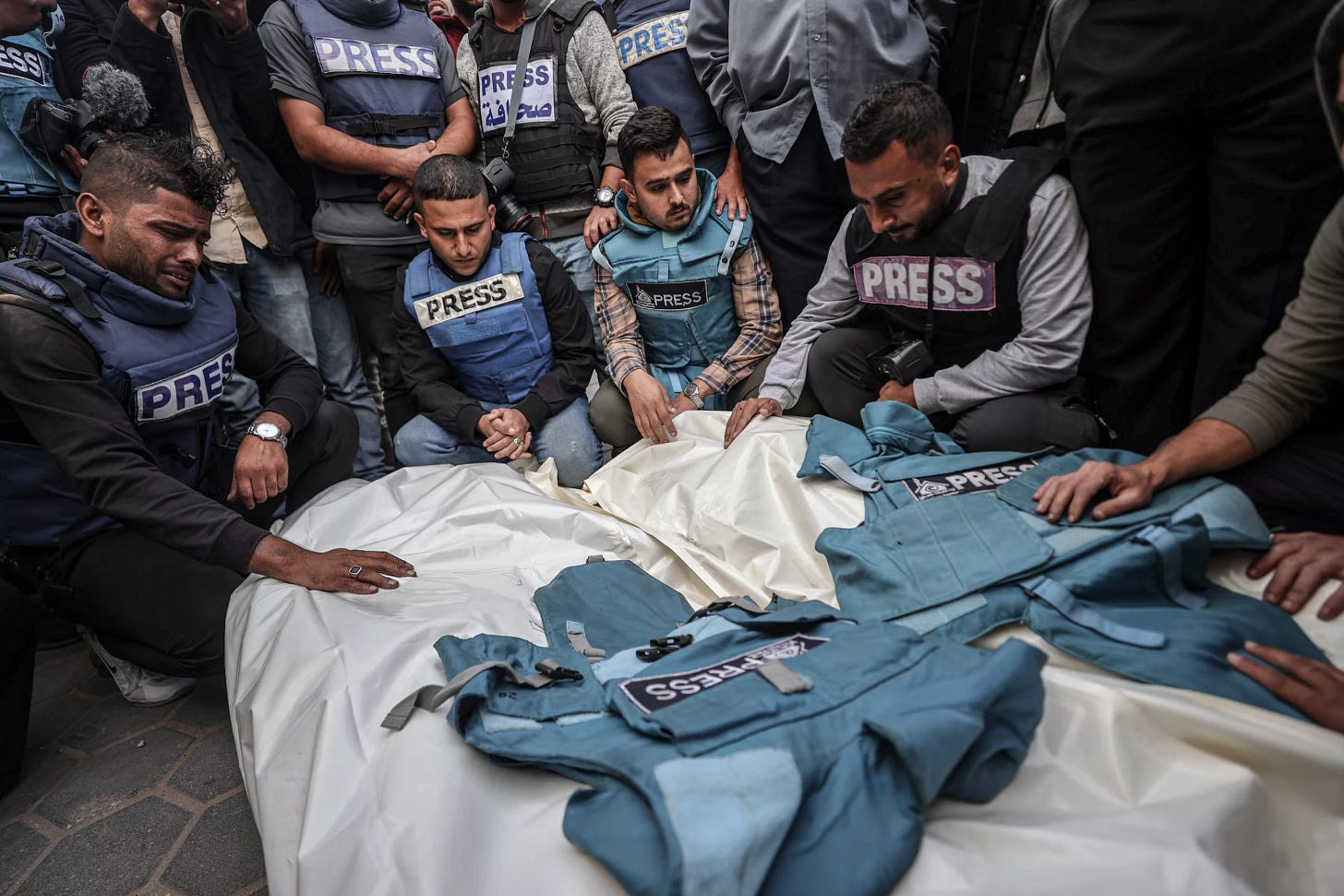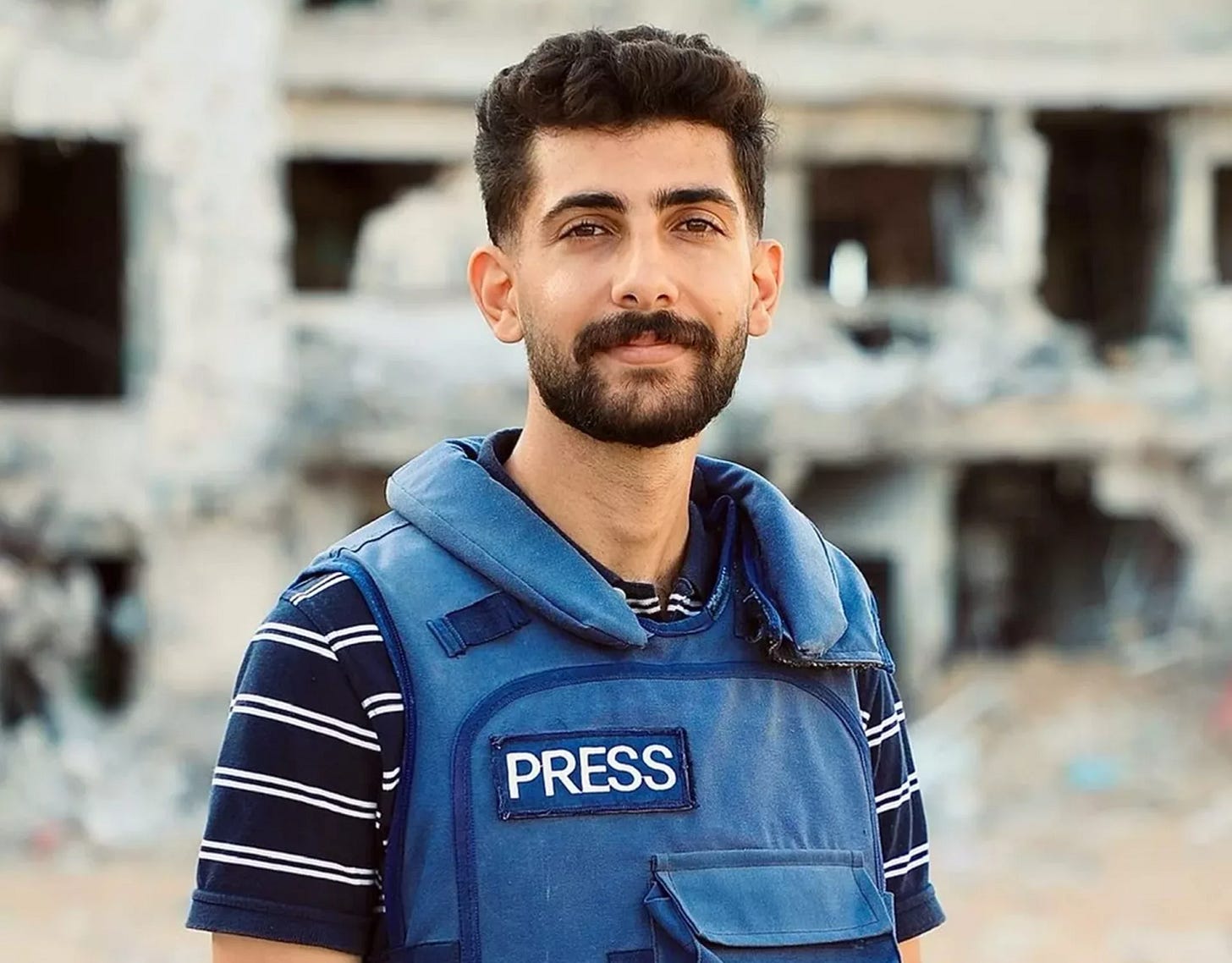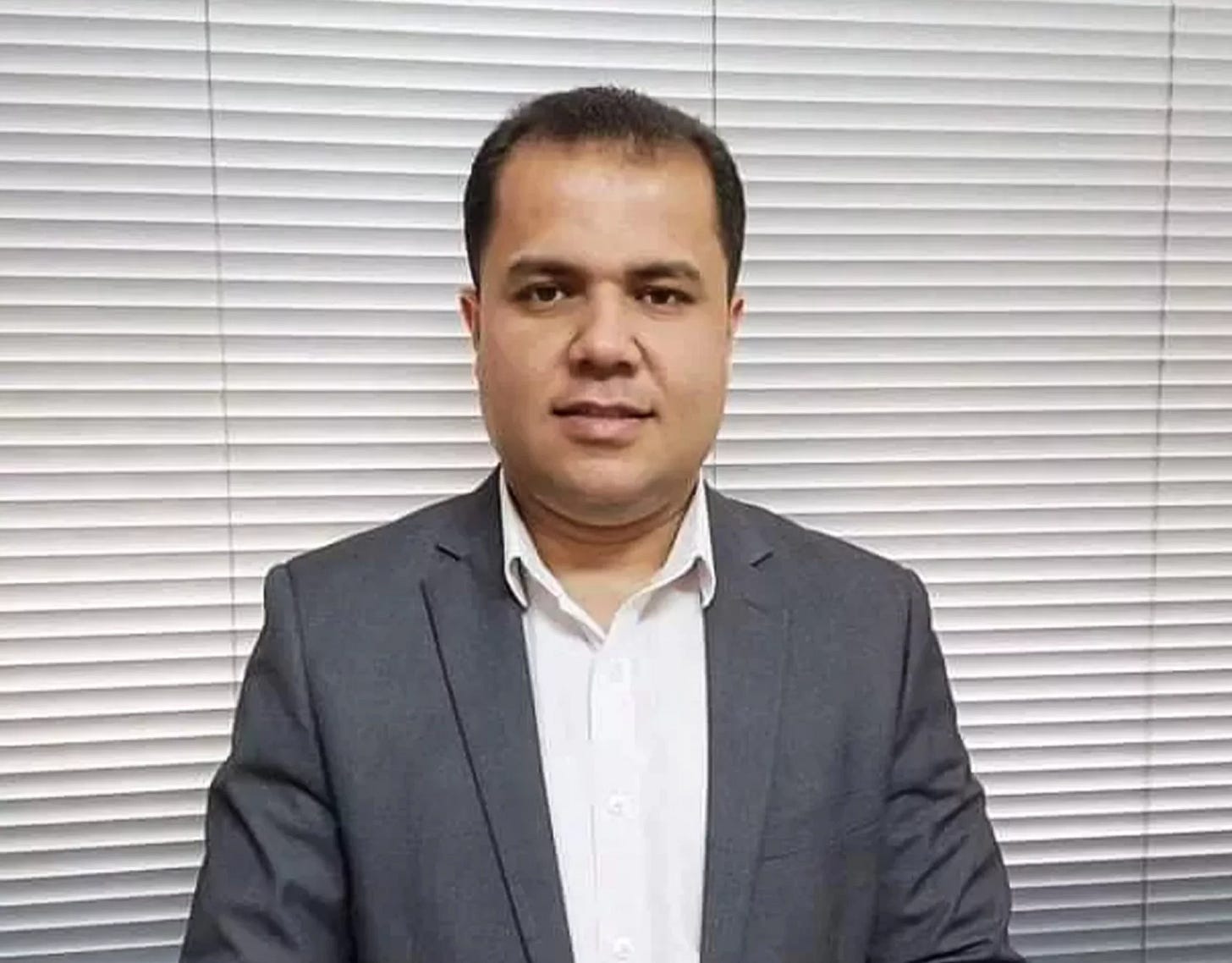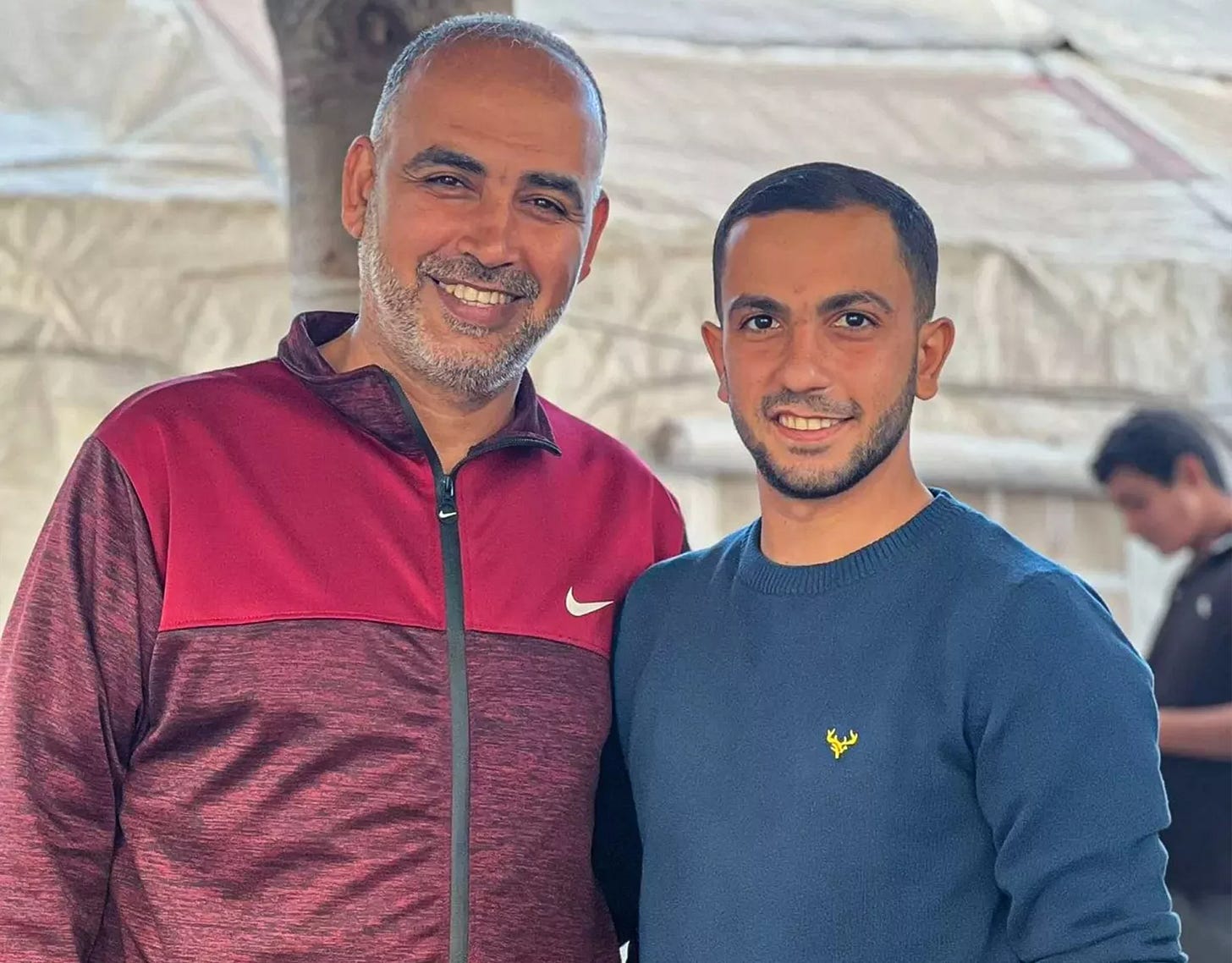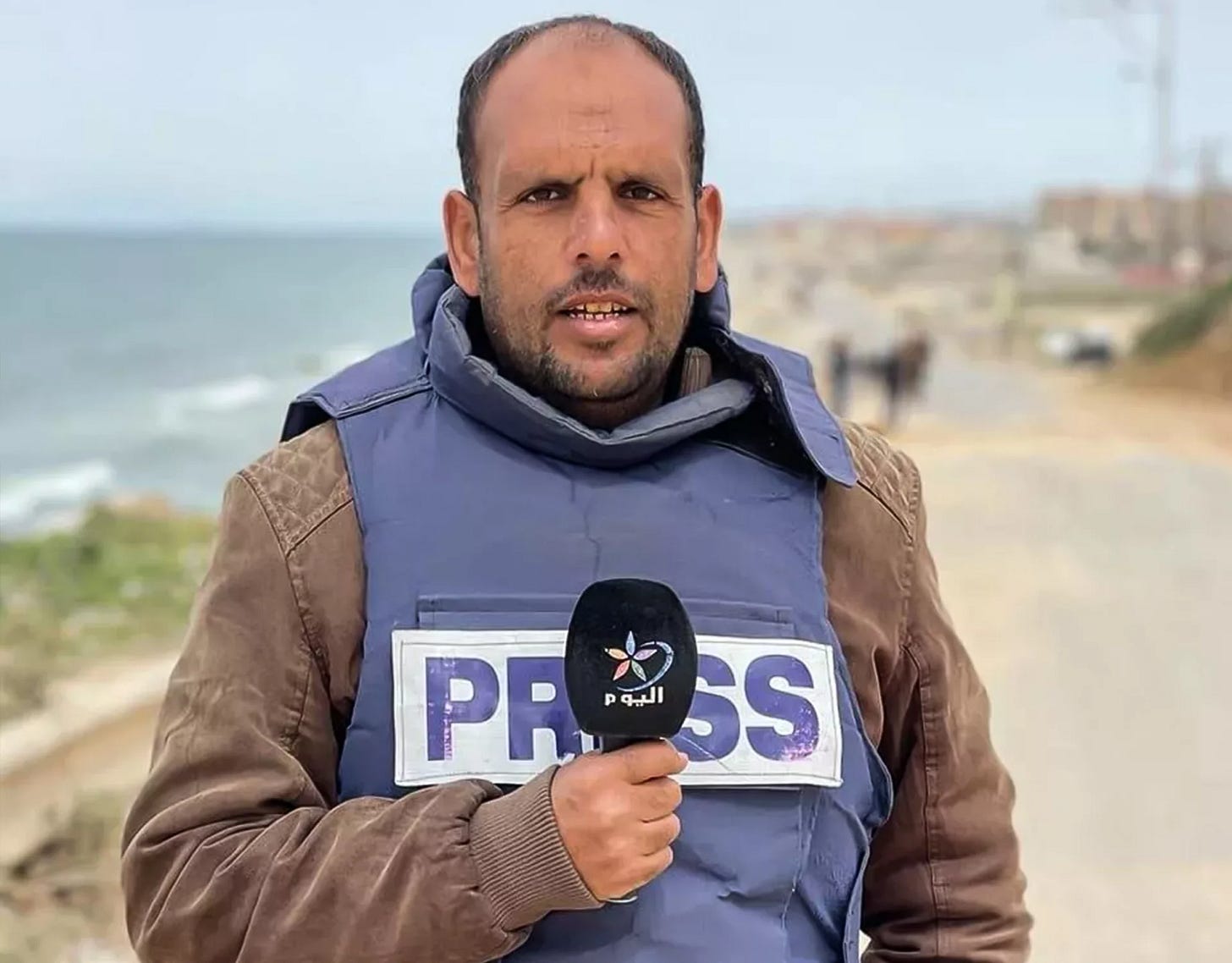The harrowing scene that unfolded on August 25 at Nasser Medical Complex in Khan Younis, broadcast live around the world, shook global public opinion. It was evident that the second shell militarily known as a “double tap” fired by an Israeli tank after journalists, paramedics, and civil defense teams rushed to aid the wounded journalist Hossam Al-Masri, was deliberately aimed to kill the entire group.
That strike killed at least 20 Palestinians, including four medical workers and five journalists. It came just days after another massacre targeting a media tent at what remained of Al-Shifa Medical Complex in Gaza City, where six journalists were killed in a direct strike.
Each targeted killing reveals more of the Israeli occupation’s audacity in manipulating facts and crafting false narratives to cover up its intentional targeting of those who carry the image and voice of Gaza. The aim is to eliminate documentation and silence the truth, allowing the ongoing genocide to proceed out of sight. Gaza, besieged by death, destruction, displacement, and starvation for nearly two years, is being deliberately cut off from the world.
This exposure, however, is not limited to Israel. It extends to the global double standard and moral collapse of international organizations, press agencies, and journalists’ unions. Many have chosen to remain silent in the face of these crimes—even when their own freelance journalists were among the victims. Some avoided naming them, while others refrained from assigning responsibility, even as the Israeli army openly admitted to the killings.
To date, over 246 Palestinian journalists have been killed. Those who remain work under unrelenting risk, carrying a heavy dual burden: surviving the war as civilians and fulfilling their professional and moral duty to document it. As colleagues fall and the world looks away, the survivors persist in bearing witness.
Being a Journalist in Gaza Means You’re Automatically a Target
Islam Badr — Reporter, Alaraby TV
Direct targeting deeply affects our ability to continue reporting and the quality of our coverage. The Israeli military clearly aims to break our will and silence us. But we’re aware of this strategy.
Life in Gaza is already difficult. Being a journalist only compounds that. You automatically become a target—not metaphorically, but literally. Even those around you feel the danger. My own siblings were denied shelter by families who feared housing a journalist’s brother. The targeting goes beyond our work it invades our daily lives and fills them with fear.
The loss of colleagues is both personal and professional. We shared months of danger and daily hardship. Their deaths anger us, because Israel kills journalists with impunity.
Each moment of this war is intense: the death of one among 60,000 victims, a bombardment, an invasion. But for me, the most powerful moment would be the day a permanent ceasefire is declared that would mean the genocide has stopped.
After months of airstrikes, injuries, and close calls, I no longer fear being targeted. What keeps me going is a blend of human, ethical, professional, and national duty. If we stop reporting, who will tell the world our stories? Who will document the suffering, resilience, and bloodshed?
Our fate is in God’s hands. Anyone living in Gaza during this war could be the next victim. It’s hard, but I accept it.
We call on international media institutions to take a firm stand, to pressure Israel to stop targeting journalists, and to provide real protection—legal, financial, and emotional. It’s the least they can do for those risking their lives to report the truth.
I Work Knowing Death Follows Me Every Moment
Karam Hassan — Freelance Photojournalist
Many foreign media outlets still parrot Israel’s narrative. Gaza has faced a devastating famine for over four months, with more than 60,000 dead. Despite documented evidence of mass starvation, Israeli propaganda denies it by showcasing small aid deliveries—barely 10% of what’s needed.
We ask these outlets to stop echoing occupation propaganda and report accurately. Solidarity must go beyond words. The attack at Nasser Medical Complex proves the goal is to kill the image and bury the truth.
One of the martyred journalists worked for a global agency, yet the agency wouldn’t even mention his name. They referred to him only as “an associate.” That’s complicity. We are not numbers. We are human beings, with dreams and lives.
After the deaths of dear colleagues like Anas Al-Sharif, Muhammad Qreiqa, and Ibrahim Zaher, the feeling that “I might be next” has become constant. I even wrote my will and gave it to friends to publish in case I’m killed. This is our reality.
Still, we persist. We must. If we don’t document these massacres, who will? We are the voice defying Israeli propaganda. Our mission is clear.
The world treats us like statistics. But we are not content or numbers. We are people, full of life, caught in a genocide that’s now two years long. Before this war, we had ambitions. Now, we just try to survive.
With every journalist killed, the risk increases that the truth will die too. But the memory of friends like Anas, Muhammad, and Ibrahim drives me forward.
The worst moment was in September 2024, covering an airstrike on my cousin’s home in Be'er al-Na'ja. I discovered his wife—my own cousin—and most of her children had been killed. I’d seen her just the day before. I couldn't even turn on my camera. I joined the rescue team instead. I had to tell her father. That day broke something in me.
I do this job knowing that death follows me. The occupation doesn’t distinguish between civilians and journalists. Yet hope remains for an end to this genocide and a future we may still rebuild.
A Photo Is Enough to Make You a Target
Mohammed Abu Qamar — Reporter, Al Jazeera Net
Palestinian journalism has always been dangerous even before the latest war. Around 50 journalists were killed between the Second Intifada and today. But the targeting has reached unprecedented levels.
The goal seems clear: to wipe Gaza out of existence without witnesses. Over 246 journalists have been killed some live on air, without any red lines.
This is enabled by the deafening silence of international journalist unions and human rights bodies. The result is that even civilians now fear standing near journalists, afraid they’ll be caught in the crossfire.
Each time we lose a colleague, we wonder: Am I next? Whether in the field or at home, the fear lingers—not just for us but for our families.
This war has changed us. We live with fear, displacement, and daily humanitarian crises. Food, water, and shelter are scarce. Even amid this, we shoulder the burden of reporting.
The fear now is that the killings won’t stop. It’s no longer isolated incidents—it’s whole teams being wiped out. Just holding a camera is enough to get you killed.
What drives us to continue is our belief in the mission. To stop would be to betray our people.
We know death could come at any time. But we will not stop telling the truth.
There’s no hope in international institutions anymore. The crimes are in plain view, and the world stays silent. Hope is gone, but our message continues.
A Daily Massacre Shrinks the Ranks of Gaza’s Reporters
Safinaz Al-Louh — Journalist and Field Correspondent
Amid a relentless campaign of genocide, we continue our journalistic work despite the risks. I move between field reports and interviews, prepare news packages, and face the constant threat with courage rooted in my love for Gaza and my belief that our land deserves every effort.
Our country has suffered and endured with us for decades. That sense of shared struggle drives our national and journalistic duty. I always tell my family: I could be next. The feeling haunts me, even in dreams, though it breaks my family’s heart.
After nearly two years of genocide and nearly 250 journalists killed, I no longer expect action from international bodies. At best, we get statements of condemnation—while Israel continues its targeted assassinations.
This is a war to silence Gaza’s press. It’s a calculated effort to eliminate images, voices, and truth. The massacre at Nasser Medical Complex is no exception—it’s part of a systematic campaign.
Each colleague killed is a thunderclap of grief. When my dear friend Maryam Abu Daqa was martyred, it felt like time stopped. She was fearless, kind, and close—like a sister. Her death was shattering.
Yet, even in pain, I remain convinced that we must go on. Our professionalism and patriotism demand it. We owe it to our people and our fallen peers to keep reporting.
Every Journalist Fears Being Next
Imad Zaqout — Journalist and Union Activist
Since the war began, Palestinian journalists have faced an unprecedented massacre. Israel’s justifications for each attack are deliberate lies. With satellite imagery, spy drones, AI, and a small geographic area like Gaza, it’s impossible not to know who is being targeted.
These are premeditated assassinations.
Palestinian journalists are closely monitored by special Israeli units that surveil, incite, and wage psychological warfare to silence them. Foreign journalists are banned from entering Gaza. Israel doesn’t want the world to see the truth.
Yet despite it all, Palestinian journalists have continued to report. For nearly two years, day and night, they have covered this war under unimaginable conditions. If one journalist is killed, another steps in.
This is a historic massacre of media workers over 246 dead. Some were killed live on air. Israel knows their power and fears their truth.
Journalists, like all Gazans, face constant displacement, lack food and water, and suffer medical and educational collapse. Still, they carry the burden of documenting war crimes.
Many have been arrested, others operate from tents after their offices were destroyed. Despite all, they persist in making the impossible possible.
The personal loss is immeasurable. Colleagues like Anas Al-Sharif, Muhammad Qreiqa, Ismail Al-Ghoul, and others are now memories. Anas in particular, with minimal tools, brought Gaza’s voice to global media. That made him a direct target.
They created what I call the “Anas Al-Sharif School of Journalism” a model of war correspondence and truth-telling.
One of the most defining early moments was covering from hospitals. We saw bodies stacked, wounds untreated, mass graves. We slept beside the dead. These images will never fade but they fueled our commitment.
What we fear most now is the war’s continuation and Gaza’s total destruction. People are exhausted, barely surviving, moving from one displacement to another.
We think of our families, but we also think of our duty. We witness the devastation firsthand and scream through our coverage.
The martyr count among journalists has reached 246. Each of us expects to be next.
We expect more from global media: not just protection, but to raise their voices, to end the bloodshed. Palestinian journalists don’t want protection alone—they want the genocide to stop.
Every Moment Could Be Our Last — But We Keep Going
Amer Al-Farra — Reporter, Al-Youm TV
In another Israeli atrocity, five of our colleagues were killed in Nasser Medical Complex while doing their jobs. Since the war began, we’ve committed to reporting on these crimes, despite losing offices, gear, and even homes.
I continue my work daily, moving between displaced persons’ camps and documenting their pain. Each time journalists are targeted, my resolve strengthens.
Losing colleagues was like losing family. We shared danger, hunger, and fear in the ruins of Khan Younis. Their deaths left an aching void.
Every journalist here faces death. We walk with our lives in our hands. Still, we know only God controls our fate.
What keeps me going is belief in my mission and my responsibility to my people. Our journalism is not just work it is a humanitarian duty.
Since 2010, I’ve covered every war and escalation. But this war is unlike anything before. We work from tents and streets. Yet, we carry on.
Do I prepare for death? Of course. Every Gazan must. From day four of the war, when our colleagues Saeed Al-Taweel, Muhammad Subh, and Hisham Al-Nawajha were killed—just meters from me I knew we were direct targets. Now, with over 246 dead, we persist.
We call on the International Federation of Journalists, media institutions, and unions to demand protection and accountability. Journalism is a right. Why are we being killed for doing our job?
Israel’s leaders must be held accountable.
I Fear Becoming Just Another Number
Basil Abu Hassan — Journalist
Every day, I fear dying like my colleagues reduced to a fleeting statistic in the midst of genocide. After their deaths, it’s clear the world isn’t trying to stop Israel or protect journalists.
There wasn’t one moment that broke me there were many. Each loss suffocates me. I wept when Anas and Muhammad were killed. Muhammad wasn’t just a reporter, he was a close friend.
What I fear most is my daughter growing up without her father’s embrace. There’s no hug like a father’s hug.
Why do I keep going? Because I can’t look away. I can’t ignore my people’s agony. Their cries are my cries.
I haven’t prepared for martyrdom, but I feel it looming every second. Only those walking Gaza’s streets amid genocide understand this.
When asked what we expect from international media, the question makes me laugh—and ache. Unless governments move, nothing will. All we ask is for someone to speak the truth. Just once.
Despite the 246 journalists killed, despite the fear, Gaza’s journalists remain. They resist with their pens and cameras. Their blood and endurance prove that truth cannot be killed.
They have built a school of journalism defined by resilience. No matter how many images Israel tries to suppress, the truth will find its way.
Two Years of Pleas, Nothing But Condemnations
Walaa Abu Jamaa — Radio Journalist and Multimedia Producer
We live our profession between fear and duty to report, even as attacks intensify against civilians and journalists alike.
Over 246 journalists have been directly targeted. Their only “crime” was holding a pen or a camera to document Gaza’s agony amid ongoing genocide.
Losing our colleagues is devastating. We endured months of fieldwork, simple meals, nights of fear and hunger together. Journalist Maryam Abu Daqa was filming when she was killed. She became the story she was covering.
We now operate in a constant state of fear and resolve. In the beginning, I thought documenting our people’s pain was my mission. Now I know the pain won’t end with the war it may deepen.
Every day I feel we could be the next “batch” of martyrs. As the war drags on, hope fades. But we still love life. We still have dreams, though they are buried under the need to survive.
I lost four of my brothers, including our little grandson Muhammad, just four years old. My mother told me, through tears, that she can no longer see clearly: “My tears blinded me.” I fear more for her than for myself.
I don’t want to be another number in a Ministry of Health report. I have ambitions. My life was full of hope. I believe our people can rebuild.
Each day may be my last, so I try to leave no regrets. I haven’t written my will. I couldn’t bear to. My greatest fear is what more grief would do to my mother.
Still, I go on. Gaza has countless human stories that must be told—stories of children, women, families that deserve documentation. Sometimes, I’ve even helped save a life or deliver aid through my reporting. Those small acts keep my faith in the power of the image and the word.
For two years, we’ve appealed to international media to protect journalists. In return, we’ve received nothing but statements. Even on a personal level, I worked for the BBC, but was denied my full wages citing banking complications. Even if I die, I won’t forgive those who denied me my rights.


